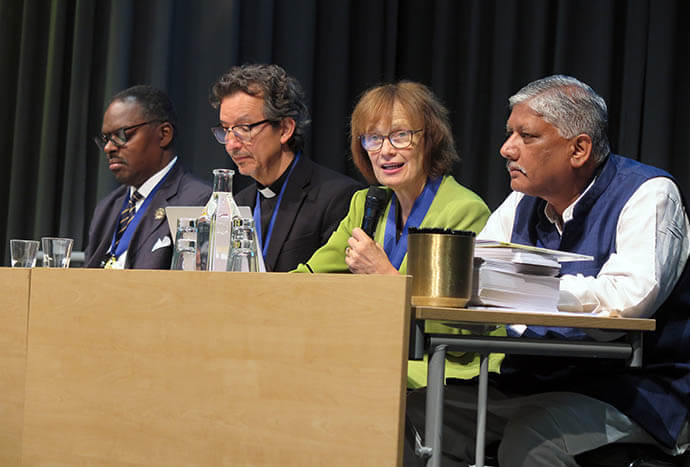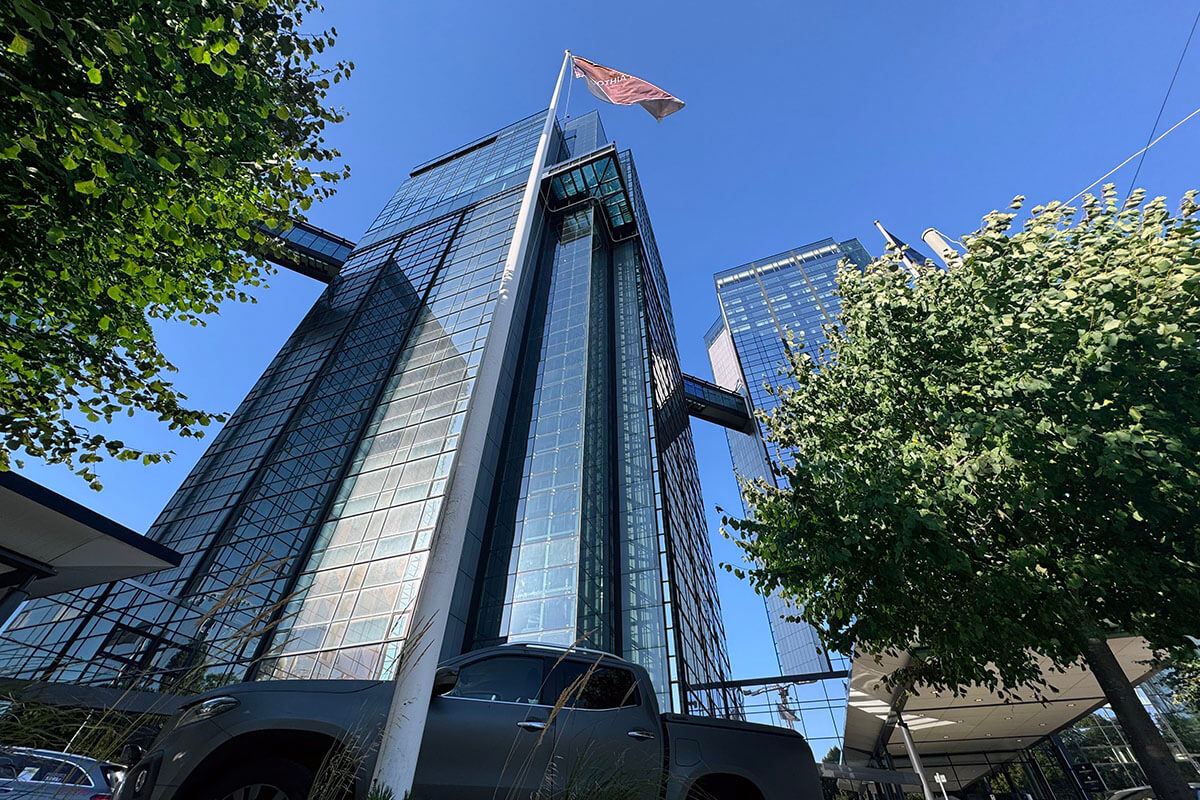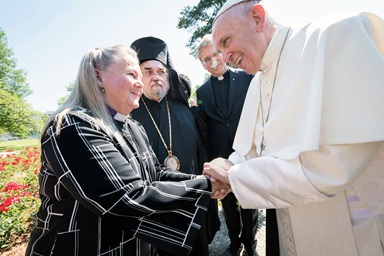Key Points:
- At the prompting of United Methodist bishops, the World Methodist Council formalized its application process for new members.
- The formalization comes as disagreements within The United Methodist Church are giving rise to new denominations.
- The World Methodist Council also addressed international conflicts including calling for a permanent ceasefire in occupied Palestinian Territories.
The United Methodist Church’s splintering has prompted Methodism’s ecumenical association to formalize its guidelines for admitting new members.
“In cases where an applicant church was historically part of a World Methodist Council member church, the Officers shall engage in conversation with both parties,” says the new “Guidelines for Membership” document adopted by the council when it met Aug. 18.
Applicants also must explain why they want to be part of the council and share the status of their existing ecumenical relations. The officers will then recommend to the full council whether to accept the applicant as a new member.
Subscribe to our
e-newsletter
The formalized membership guidelines come as departures from the World Methodist Council’s largest member, The United Methodist Church, have led to the launch of new breakaway denominations and already have shaken up some relationships within the wider Wesleyan family.
The World Methodist Council took up the membership guidelines at a meeting after the closing worship of its 22nd World Methodist Conference. Unlike the festive Aug. 14-18 conference — which was primarily a time of fellowship and worship — the council meeting that followed was almost all business. Over three hours, about 200 voting delegates from six continents adopted statements on a range of international and religious issues including calling for a permanent ceasefire in the occupied Palestinian Territories.
The membership guidelines sought to address concerns closer to home.
Retired United Methodist Bishop Rosemarie Wenner, who helped draft the guidelines, stressed that what the ecumenical body approved was basically the same application process the ecumenical body had long been using.
In fact, immediately before the World Methodist Conference, the council welcomed its newest member — the Thailand Union Methodist Church, which has roots in a Korean Methodist mission to the country.
But at the prompting of United Methodist bishops, the World Methodist Council’s membership guidelines are now written down.
“We saw it as an affirmation to help clarify a process that is in place already,” said Wenner. She serves a part-time role as one of two ecumenical officers for the United Methodist Council of Bishops. She also is the Geneva secretary for the World Methodist Council.

The ecumenical body, founded in 1881, is a worldwide association of some 80 denominations with Methodist heritage representing more than 80 million members in 138 countries.
“Through the Council,” the membership guidelines say, “Churches whose roots are traced to the Wesleyan movement in the 18th century connect by listening to and learning from one another, offering mutual encouragement and engaging in united witness in the ministry of making disciples of Jesus Christ.”
The United Methodist Church — with more than 9 million members of its own on four continents — is both the council’s largest member denomination and, by far, its biggest financial contributor. For example, United Methodists paid about 75% of the more than $504,000 in membership dues that the council received in 2023.
But over the past few years, like other Protestant denominations in the U.S. before it, The United Methodist Church has undergone a separation of sorts after decades of intensifying debate over LGBTQ people’s inclusion in the church.
Since 2019, nearly 7,900 U.S. congregations — including 218 this summer — have received the necessary approvals to leave The United Methodist Church with property. Twenty-three churches in the Baltic nation of Estonia also departed last year and formed the Estonia Methodist Church, which already has signed a mutual recognition agreement with The United Methodist Church.
Call for ceasefire and other actions
- Call for prayer and work with governments for peace on the Korean Peninsula.
- Urge Methodists/Wesleyans globally to continue to pray, express solidarity with victims of war and work toward a just peace in Ukraine and Eurasia.
- Commit to working in solidarity with world communions, ecumenical bodies and the Churches in Sudan in their efforts to facilitate an end to civil war and the creation of a just peace in Sudan.
- Reiterate the call for its member churches to keep global migration as a primary focus of learning, reflection and action during the next five years.
- Support the New International Financial and Economic Architecture, an ecumenical movement for tackling debt and sustainability.
- Express profound disappointment at the absence of a number of World Methodist Council and Conference invitees, including at least 10 youth and young adults, due to unfavorable action on their travel visa applications.
As all this has been developing, the Global Methodist Church — a theologically conservative breakaway denomination — also has been getting off the ground. The Global Methodist Church, organized by conservative United Methodist advocacy groups that back bans on same-sex marriage and gay clergy, launched in May 2022 and has been recruiting mainly from the United Methodist fold ever since.
As of May this year, the Global Methodist Church said it had about 4,500 congregations. The new denomination plans to hold its convening conference later this month in Costa Rica.
However, United Methodist bishops have denounced some of the new denomination’s recruitment tactics — which the bishops said failed to acknowledge United Methodists as fellow Christians. Leaders of the Global Methodist Church and advocacy groups, the Wesleyan Covenant Association and Good News, have insisted they do see United Methodists as fellow Christians.
But even now, legal disputes continue over church property in Nigeria, where former bishop John Wesley Yohanna resigned with his cabinet in July to join the Global Methodist Church. On behalf of a large portion of the country’s United Methodists, 995 Nigerian delegates recently voted to remain in The United Methodist Church.
With the ongoing friction in mind, the World Methodist Council sought input from the United Methodist Council of Bishops when Global Methodist leadership approached the ecumenical body about possible observer status.
The Council of Bishops responded, saying it “encourages all requests from those applying for membership in the World Methodist Council when those applying mutually recognize all churches in the WMC as valid Christian expressions and as valid expressions of the Wesleyan Tradition.”
While the new World Methodist Council membership document makes no direct mention of mutual recognition, it does spell out the commonalities its members should share.
To be eligible for membership, churches in the Methodist/Wesleyan tradition must:
- Have a doctrine in keeping with the traditional standards of Methodist doctrine.
- Affirm the Holy Scriptures of the Old and New Testament as the primary rule of faith and practice and the center of theological reflection.
- Profess the ancient ecumenical creeds, the Apostles’ and Nicene Creeds.
- Have a measure of autonomy, history and strength in its particular country and/or situation.
- Be a national, regional or global church.
No one from the Global Methodist Church attended the World Methodist Conference.
However, the Rev. Dr. Larry Duggins of the new Methodist Collegiate Church was among the more than 1,000 people enjoying the conference. His denomination has just started the application process to join the World Methodist Council.
White’s Chapel in Southlake, Texas, near Fort Worth, started the new denomination as it was disaffiliating from The United Methodist Church in 2023. Today, Duggins said the new denomination includes seven former United Methodist churches in Texas and Louisiana as well as about 70 former United Methodist churches in Kenya, Congo and Uganda.
Even with their exit from The United Methodist Church, he said members of the new denomination want to maintain ties.
“We had a conservative congregation, and so because of that, we ended up needing to take the conservative views on the human sexuality issue,” Duggins said. “But that didn’t mean that we wanted to throw away our connection with everybody who disagreed.”
In other parts of the world, United Methodists conferences are in various stages in the process of departing after this year’s General Conference eliminated decades-old denomination-wide bans on “self-avowed practicing” gay clergy and same-sex marriage.
United Methodists in the Eurasian countries of Russia, Belarus, Kyrgyzstan and Kazakhstan have received General Conference’s blessing to leave and form the autonomous Christian Methodist Church early next year.
The United Methodist conferences in Côte d’Ivoire and Czechia (also known as the Czech Republic) are still preparing their departure. Before the departures become official, the conferences will likewise need approval by the next General Conference, scheduled in 2028.
The Côte d’Ivoire Conference plans to return to being an autonomous Methodist denomination, and the Czech conference has not yet determined whether it will become autonomous or join another Methodist church.
It should be noted these conferences are all following the same process that Swedish United Methodists used about a dozen years ago to form the Uniting Church in Sweden, which hosted the recent World Methodist Conference with assistance from United Methodists in neighboring Denmark and Norway.
Like the Swedish church, these exiting conferences might also become denominations eligible for membership in the World Methodist Council and thus maintain connection with the extended Methodist family.
United Methodist Bishop Debra Wallace-Padgett, who is just beginning a five-year term as the World Methodist Council’s president, described that connection as crucial to the ecumenical association’s ministry. Wallace-Padgett is the bishop of The United Methodist Church’s Holston and West Virginia conferences.
“There is quite a reach that we have in this world Methodist movement,” she told the council meeting. “To build on that and to develop new initiatives in response to the needs of the world and the leadership of the Holy Spirit will be significant, and that is my hope and prayer.”
Hahn is assistant news editor for UM News. Contact her at (615) 742-5470 or [email protected]. To read more United Methodist news, subscribe to the free Daily or Friday Digests.




